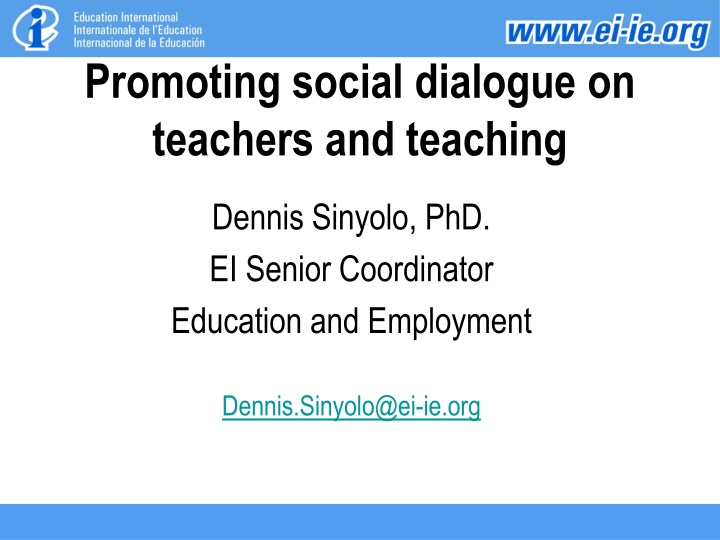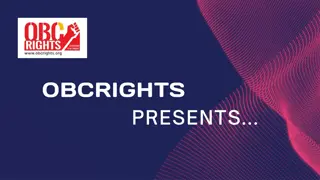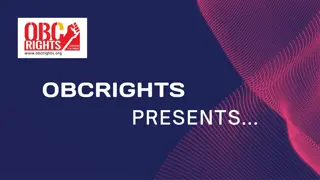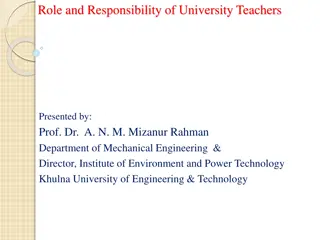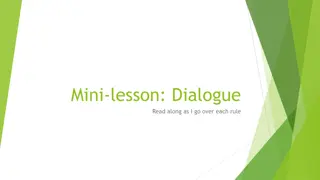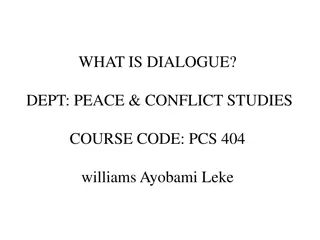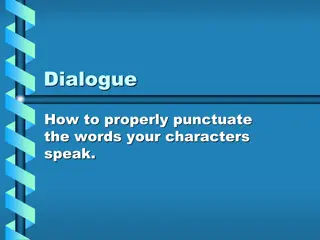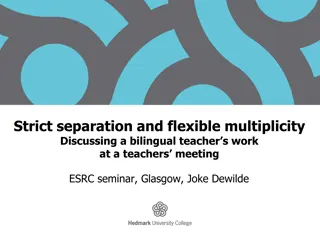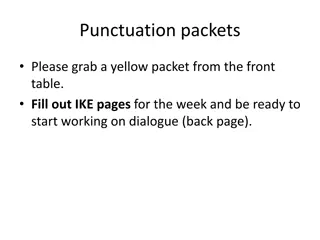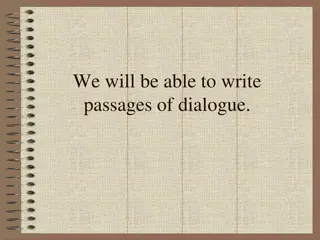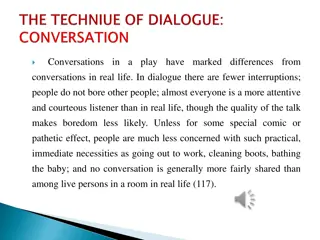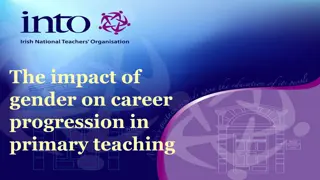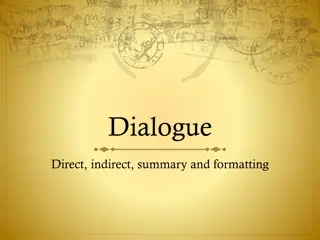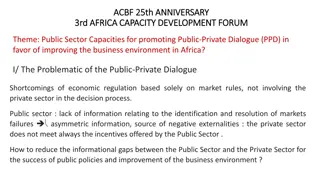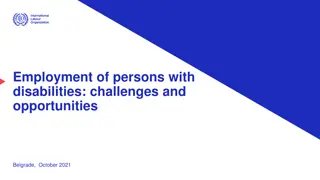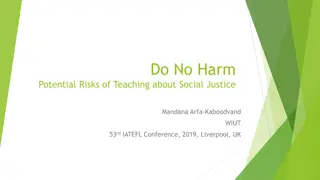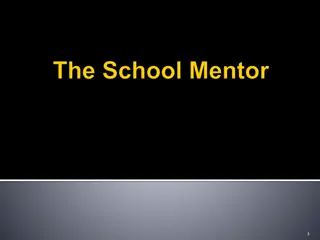Promoting Social Dialogue on Teachers and Teaching - Summary and Examples
Social dialogue involves negotiation and information exchange among governments, employers, and workers in addressing common issues. This presentation highlights the importance of involving teachers in policy dialogue, showcasing examples of mechanisms for social dialogue in education.
Download Presentation

Please find below an Image/Link to download the presentation.
The content on the website is provided AS IS for your information and personal use only. It may not be sold, licensed, or shared on other websites without obtaining consent from the author.If you encounter any issues during the download, it is possible that the publisher has removed the file from their server.
You are allowed to download the files provided on this website for personal or commercial use, subject to the condition that they are used lawfully. All files are the property of their respective owners.
The content on the website is provided AS IS for your information and personal use only. It may not be sold, licensed, or shared on other websites without obtaining consent from the author.
E N D
Presentation Transcript
Promoting social dialogue on teachers and teaching Dennis Sinyolo, PhD. EI Senior Coordinator Education and Employment Dennis.Sinyolo@ei-ie.org
Summary of presentation 1. What is social dialogue? 2. To what extent are teachers currently involved in social/policy dialogue? 3. Why promote social/policy dialogue on teachers and teaching? 4. Examples of social dialogue mechanisms 5. Conclusions and recommendations
What is social dialogue? Social dialogue is defined as all types of negotiation, consultation or simply the exchange of information between representatives of governments, employers and workers on issues of common interest. It covers tripartite processes and institutions of social dialogue, such as collective bargaining (ILO). Policy dialogue is part and parcel of policy and decision-making processes intended to contribute to developing or implementing a policy change following a round of evidence-based discussions/workshops/consultations on a particular subject (WHO). Example: GPE s Local Education Groups (LEGs)
Indaba: the African concept of social dialogue In traditional African culture, an indaba is convened to address problems or issues of common concern. Everyone has a voice and contributes to finding a solution to the problem (s) affecting the community or entire nation. Common understanding reached during the indaba allows everyone to own and support the agreed solutions. To what extent are teachers involved in policy dialogue?
Teacher involvement in policy dialogue? When the government takes measures to reform education: 10% Teachers and support personnel are consulted and their views are taken into account. Teachers and support personnel are consulted but their opinions are ignored 33% 58% Teachers and support personnel are not consulted
Teacher involvement in decision-making Are you consulted on decisions affecting your professional life? 18% No Yes 82%
Social dialogue in Education 2030 FFA Teachers have socio-economic and political rights, including the right to seek decent working conditions and adequate remuneration. Governments should make teaching an attractive, first-choice profession with continuing training and development by improving teachers professional status, working conditions and support, and should strengthen policy dialogue mechanisms with teacher organizations (FFA, par.72).
Social dialogue in Education 2030 FFA (cont.) Set up or strengthen mechanisms for institutionalized social dialogue with teachers and their representative organizations, ensuring their full participation in the development, implementation, monitoring and evaluation of education policy (FFA, par. 74). Teachers should therefore be in involved in the entire policymaking process
The policy making process Problem Identification and Agenda Setting Policy Formulation Evaluation Implementation Adoption
Why involve teachers and other stakeholders in social/policy dialogue? To ensure buy-in, ownership and support from those involved in policy implementation (teachers, school leaders, education support personnel ) To ensure buy-in, ownership and support from a wide range of key education stakeholders (government ministries/departments, civil society, parents, development partners ) Stakeholder participation and voice in the policy making process is crucial for the success of education and teacher policies
Examples of social dialogue mechanisms Example 1: Local Education Groups (LEGs: part of the policy dialogue mechanism of the Global Partnership for Education (GPE). Development of education sector plans and GPE funding proposals Capacity building for effective participation in national policy dialogue: teachers (GRA project) and civil society (CSEF)
Examples of social dialogue mechanisms (cont.) Example 2 The International Summit on the Teaching Profession (ISTP): An annual event that brings together education ministers and teacher union leaders from OECD and partner countries to discuss how to improve the status of the teaching profession, teacher quality, teaching and learning. ISTP co-convened by the OECD, various host governments (beginning with the US) and EI since 2011 EI to initiate regional summits using an adapted model of ISTP, beginning with Latin America and Africa
Issues addressed in various summits Year Venue Theme/main issues addressed 2011 New York Improving teacher quality around the world 2012 New York Developing school leaders, preparing and supporting teachers for the 21st century Teacher quality 2013 Amsterdam 2014 Wellington Excellence, equity and inclusiveness High quality teaching for all 2015 Banff Implementing highly effective teacher policy and practice 2016 Berlin Teachers professional learning and growth: Creating the conditions to achieve quality teaching for excellent learning outcomes
Conclusions and recommendations 1. Governments, teacher organisations and other stakeholders should engage in genuine dialogue about the professional status and working conditions of contract teachers and all teaching personnel. Such dialogue may focus on: Teacher training and professional development Teacher evaluation and feedback systems Teacher support systems, leadership and governance Salaries and working conditions Teaching and learning tools and resources Privatisation and commercialisation of education etc.
Conclusions and recommendations (cont.) 2. Governments should provide a legislative framework for social dialogue with teacher organisations, as well as civil society and other stakeholders 3. Governments/teacher education institutions should provide upskilling and upgrading programmes (pre and in-service training) for all unqualified and underqualified contract teachers, leading to certification, qualification and recognition. 4. Governments should develop, finance and implement comprehensive teacher policies aimed to ensure that all learners are taught by qualified, motivated and well-supported teachers
Conclusions and recommendations (cont.) 5. The Teacher Task Force should come up with concrete follow- up activities to the study on contract teachers and this conference, including providing technical support to countries that want to tackle this problem
Let us Let us unite for unite for quality quality education education and and teachers! teachers!
